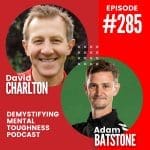
Cricket Psychology Tips: Are you anxious about returning to sport?
Sport is back! Well, nearly…
As of 21st May, England’s bowlers will take part in staggered training sessions across seven grounds as a start of individual training ahead of the English Cricket Board’s (ECB) planned international fixtures this summer, due to start on the 8th July.
Bad news for those of us who aren’t up to international standard, despite our world beating, lockdown-best figures in the back garden suggesting otherwise – competitive recreational cricket is still suspended. The good news? Limited practice is now permitted in England. Net sessions can take place in groups of no more than 2 people (unless it is exclusively between people of the same household) and one-on-one coaching is allowed. Even more positively, Sir Jeremy Farrar, who is part of SAGE (the group of scientists advising the government’s response to the pandemic), has suggested recreational cricket may be possible by August, conditional on the government’s success regarding relaxation of lockdown.
‘There’s Anxiety at the Crease…’
But even though a return to playing is an exciting prospect to many, it’s only natural to feel hesitant towards playing no matter how much you love it. Key questions that will no doubt arise in some people’s thoughts will be: –
- Will I be safe?
- Am I going to be prepared as well as everyone else, ready to start?
- I’m bound to be rusty and unprepared; can I play like I want to?
- Could I lose my place if I don’t play like I’m expected to after having such a long break?
Letting doubt manifest itself in the form of negativity towards playing again is more common than you think, especially if you feel burdened by your own expectations. Yet not dealing with this negativity can lead to your performance suffering. In turn, this wrongly reaffirms that you knew that you would perform badly in the match, rather than this being a result of the extended break, not performing to your high expectations or even just an ‘off day’ –this becomes a self-fulfilling prophecy.
As a result, when you finally return, you may feel like you cannot focus properly, important when you’re at the crease or in the field for long periods of time. You lack the sharpness that you once had which made you stand out in the slips. The uncertainty might reach its peak when you drop what would normally feel like an easy catch, leaving you feeling like the weak link in the team and doubting your safety for a place in the next match. Familiar, right?
A common feature when returning from the off-season, they are, without a doubt, exacerbated by the pandemic we are facing and the long lay-off it has caused. You’d be forgiven if you think that you are the only person feeling this way.
For this reason, I would like to offer some guidance based on the feelings of two of the best cricketers in the world, who have both weighed in on cricket’s impending return, none other than England’s Jos Buttler and India’s Virat Kohli.
Picture It
Buttler talks about the uncertainty that all players are facing surrounding safety and the apprehension this is causing in a player’s physical game. He goes on to say that even for a professional like himself it can take him days to work out and process these feelings and how he can control them. While I do not wish for anyone to feel anxious or apprehensive at all, amateur and up-and-coming players may feel more at ease knowing that a professional of Jos Buttler’s standing experiences emotions like this despite him being at the pinnacle of the English game.
What separates a professional international player from one of us is how effectively we deal with this apprehension. In order to reacquaint ourselves with our game, we can use a tool we all have access to, mental imagery. This will speed up the process of familiarising ourselves with playing again, and the emotions and experiences we feel without actually involving ourselves in a match.
By using as many senses as possible, try to picture yourself playing. For example, from my perspective as a bowler, feel the ball in your hand at the start of your run up. Take a look around and see where your team is placed, who is playing around you, which wicket are you playing on. Try to imagine the smell of the pitch and hear the sounds around you of your teammates’ encouragement. Small steps are important, and you shouldn’t expect yourself to be able to place yourself in the middle of a game straight away, but with practice this is an achievable target! Try writing this down for you to refer to in future to make it easier and, even better (but only if you are able to in accordance to government guidelines) try this outside or even at your pitch.
Head in the Game
Virat Kohli suggests that this break is a great opportunity to learn and improve mental strength, attributing his success to strong mental fitness and feeling this puts him in a good position to start from once he returns to the game.
An athlete’s attitude towards the small things, even habits, is important. From now, start to prepare as if pre-season is commencing. So, once it actually begins, you’re already in the headspace of ‘competing’ athlete, not ‘pre-season’ athlete, which provides you with the edge over not just teammates, but rivals too. Kohli doesn’t know if he will return to the sport this year, but by being as ready as he possibly can mentally, he is showing part of what makes him arguably the best batsman currently in the game.
How can we do that?
For a start, this doesn’t need to be in a sporting context. For example, do not approach any task with a half-hearted attitude. Set yourself a time limit. Complete it to a higher level of standard that you would have set a week ago and don’t stop until it is complete. This could be anything from household cleaning to actual training goals. This begins to motivate ourselves in a different way to how we may have approached tasks in throughout this long lockdown period, readying us for the return to work/sport/normal-as-can-be life set to resume soon.
Push yourself as you would if you were mid-season as this motivation and attention to detail will make it all the easier to readjusting to playing sport again. While physical fitness may currently be the most important and recognised factor to reaching match fitness, mental fitness shouldn’t be ignored. While most of us cannot currently train physical fitness to the level we want, perhaps this time can be used to kickstart our mental fitness for the season, using small and manageable steps.
It’ll be a long time before the effects of this pandemic are nothing but a distant memory, and some may never forget this time, but it doesn’t mean the healing of confidence shouldn’t and couldn’t start now.
What better way to do this than with something that you love doing?
If you’d like to learn more about helping yourself during this challenging period why not sign up to the “The Mental Edge” where you’ll receive regular tips and advice.
To get in touch for one 2 one Sports Psychology Coaching with a Tom Short, Mental Skills Performance Coach and Sports Counsellor , based near Northallerton, North Yorkshire – Telephone, SKYPE or online calls are available.

Best Wishes
Tom Short
Mental Skills Performance Coach and Sports Counsellor located near Northallerton, North Yorkshire. Has a keen interest in team sports where he enjoys helping athletes get the most from their talents.







